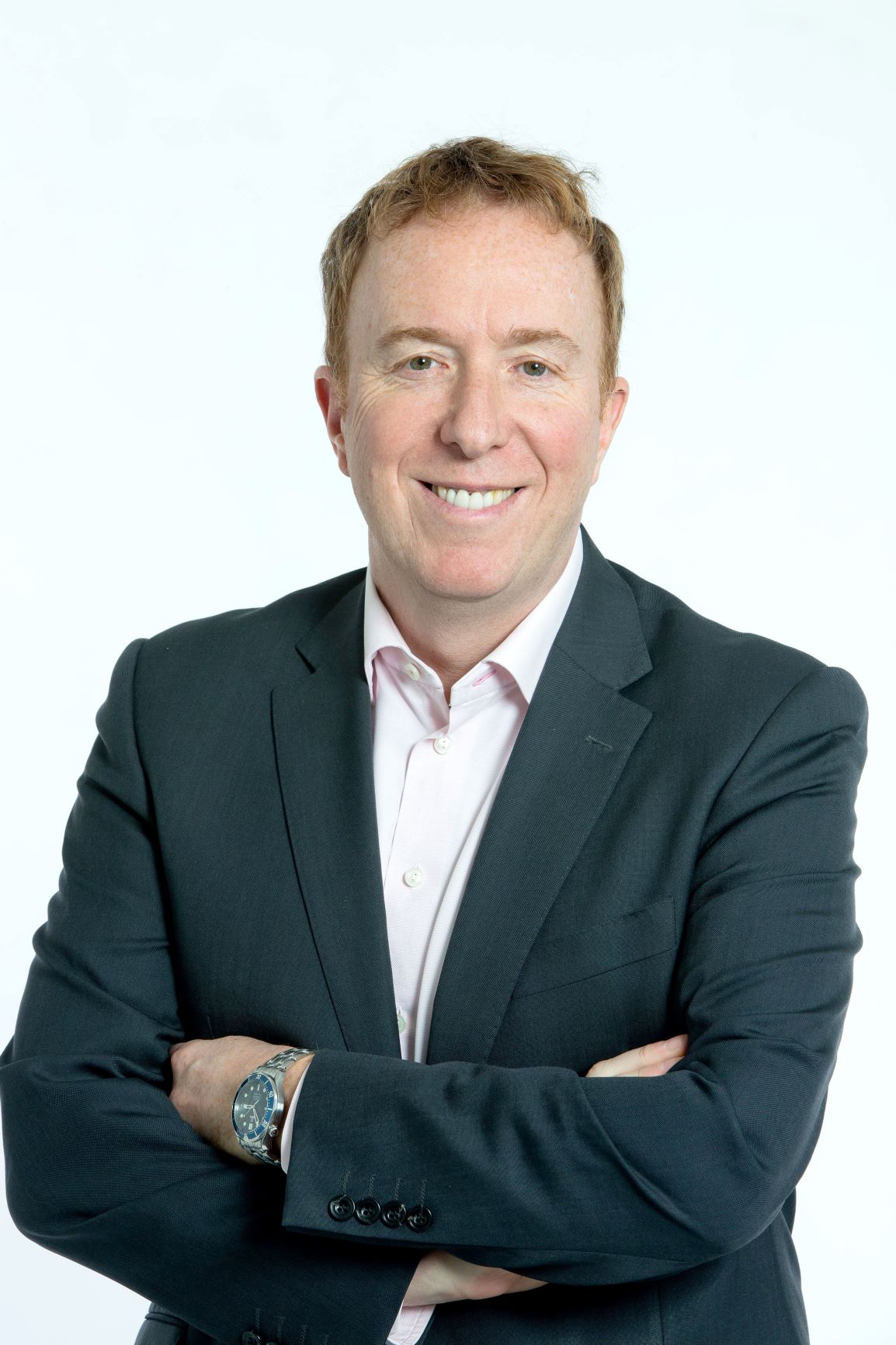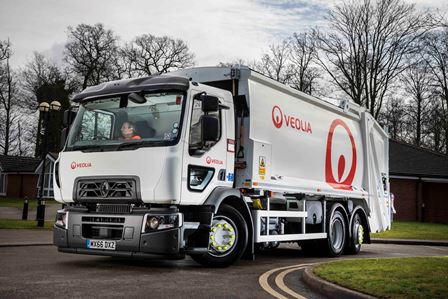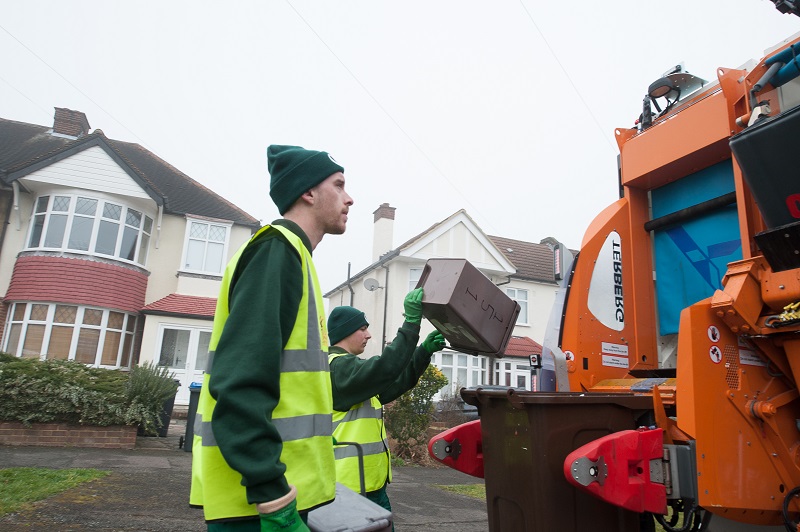Legislation to drive recycled content and deliver a resources and waste strategy is vital, says Veolia UK and Ireland’s executive vice-president, Gavin Graveson who discusses his aspirations for the business with Steve Eminton.
Politics has to be top of any agenda for discussion at the moment and for Gavin Graveson, this means one thing. It’s not that one particular party should succeed on the 12th, but rather that as all the parties have manifesto ideas for the environment and sustainability, whoever is elected should drive these proposals forward.
He explains: “We definitely need a resources and waste policy coming out of the election. We need some government lead because one of the problems is that we have had a vacuum for a number of years on policy and it’s very important for us in shaping our investment strategy.”
Mr Graveson cites the landfill tax as an example of a policy put into legislation, which had an impact and allowed investment. “It was a financial stimulus that drove waste away from landfill. Now we also need to drive through sustainability in resource recovery in the UK.”
10-year vision
Landfill tax, he says, as the current tool, is at the “right level” going up by RPI each year, although he would rather have it set for 10 years. “That’s what we would like in the resources and waste strategy – a sustainable 10-year vision.”
He insists that he is being realistic in wanting a policy in place before investment. His response is firm, that while there are targets and policies proposed, they need to be set in legislation.
The weight of this view is clear. Veolia, the market leader, has already been based in the UK for over 30 years investing nearly £2 billion and is willing to commit more, “but what we want as an international company is that this strategy is passed and is in statute.”
Recycled content
If he could pick a cherry to be confirmed from within the strategy published by the outgoing current Conservative regime, what would it be?
This, he says, would be making recycled content mandatory. “We’ve seen the market change overnight when the 30% level for recycled plastics content was announced. There is a demand now for recycled plastics; businesses understand this is going to happen so they want to get ahead of the game and they are aware of political and public pressure to increase the recycled content in their products.
“We’ve seen the market change overnight when the 30% level for recycled plastics content was announced.”
With a number of manufacturers announcing they will be using recycled plastic, will there be enough to meet demand?
Mr Graveson responds, that “at 30% yes, 30% recycled content implies only 30% recovery, they shouldn’t be worried. When you think that you are only capturing 30% of what you are producing, that’s not high.”
PET
He also points to Veolia’s investment in its HDPE bottle facility at Dagenham and reveals that a new UK stream of PET bottle recycling is on the company’s agenda for 2020. Veolia is “looking to invest substantial amounts of money in a new PET site. We start investing next year and we are evaluating a number of locations at the moment.”
Describing the proposed PET plant investment as typical of the circular economy projects which the company invests in, he explains: “We model projects based on circular principles with a fully integrated supply chain that meet customer demand.”
Local authorities
Waste management companies as a whole are taking a more careful approach to local authority contracts because of the costs involved in delivering services and the state of the commodities market. In some instances, they have stepped away from tendering or the council has changed its requirements after discussions.
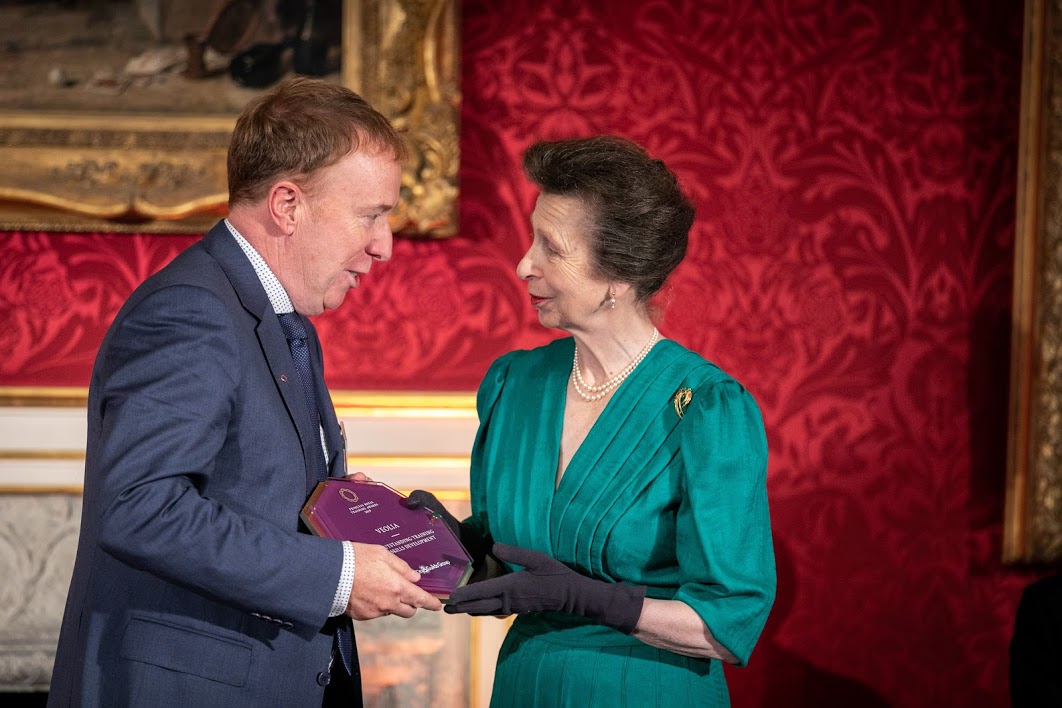
Gavin Graveson receives the Princess Royal Training Award from HRH Princess Anne earlier this year in recognition of the company’s ‘Respect at Work’ initiative
So, because of the current market pressures, for Veolia are local authorities as important as they were?
“Yes, local authorities are part of our portfolio, we have a great number of existing clients with whom we work hard and are continually looking to bid and win new contracts,” emphasises Mr Graveson. “Part of our culture and ethos is to support the public and private sectors.”
Nevertheless, is Veolia more cautious about affordability for councils?
“No. We offer a competitive service – it depends on what the local authority wants. Local authorities have political aspirations as to the type of service they want, there’s a financial limit to what they can afford and sometimes they don’t marry up; therefore you have to face reality.”
Advocating an open dialogue tender where the industry can come forward with their best ideas to help councils meet their affordability criteria, he remarks: “When it’s a closed dialogue it reduces the opportunities for innovation.”
“We’re not prepared to take a full risk on all of the recyclates”
With regard to the commodities market and falls in the value of material, Mr Graveson says that local authorities are getting more realistic over their risk share of recyclates. “They’re intelligent, they understand the situation. We’re not prepared to take a full risk on all of the recyclates so with most of the tenders coming out now there is a balance on that.”
When there’s a change of service it’s necessary that local authorities “communicate with residents that there may be a reduction in the level of street cleansing because of austerity. But, informing the public they are getting less because of cost-savings is a difficult one,” he comments, reasoning it is important nevertheless “to be transparent with the members of the public as to what can be afforded.”
Recycling
Recycling and a circular economy are the main feature of Veolia’s activities, he says. “Veolia’s position in the marketplace is as a fully integrated business, from collection to treatment all the way through and working with the circular economy.
“We are a big advocate of increased recycling, we want to do as much recycling as possible and, for example, that’s why we have invested in our plastics plants; we started our first plastics plant five years ago. We also have the circular economy process of sending our glass for recycling into insulation.”
Regarding a recycling percentage target, Mr Graveson’s view is that “we should recycle as much as we can based on a market-driven approach, that’s why we’re so positive about having a minimum recycled content in all products. If you don’t generate the market, no matter how much you stipulate it won’t happen. The best bit of news was when the government put out that requirement for a 30% minimum recycled content. It stimulates the market and the market will react quickly.”
Similar targets are not needed in the wood market, he reasons, as this works well. “The government stimulated biomass with ROCs. We are starting to import wood from our own operations in France to feed the UK biomass market which is a benefit from being an international company.“
Quality
He thinks the commodities market is having a difficult time because of the Chinese National Sword “which has been a political intervention in the market and shows that we should build as much as we can in the UK of our own infrastructure.”
“Veolia has protected ourselves with good quality,” he states. But, he warns councils that they will need to recognise the quality issue. “Local authorities at the moment on commodities have to understand the long-term volatility and that quality is king. If we get the resources and waste policy and we get standardisation of collection methodology, maybe in the UK we will get better quality.”
Energy
One area where Veolia has had some knockbacks is in approval of energy-from-waste (EfW) plants. One for Hertfordshire was turned down at Secretary of State level, although recently the company has had plans for a new one approved in Heysham, Lancashire.
Will more EfW plants be approved?
“Yes, I think they will be where there is an informed community and they understand it and there is not political interference; proposed plants should go through due process.”
With plants in the north seemingly more likely to win approval than in the south, Mr Graveson says he doesn’t want to see “a north-south divide, where waste is shifted from the south to the north.
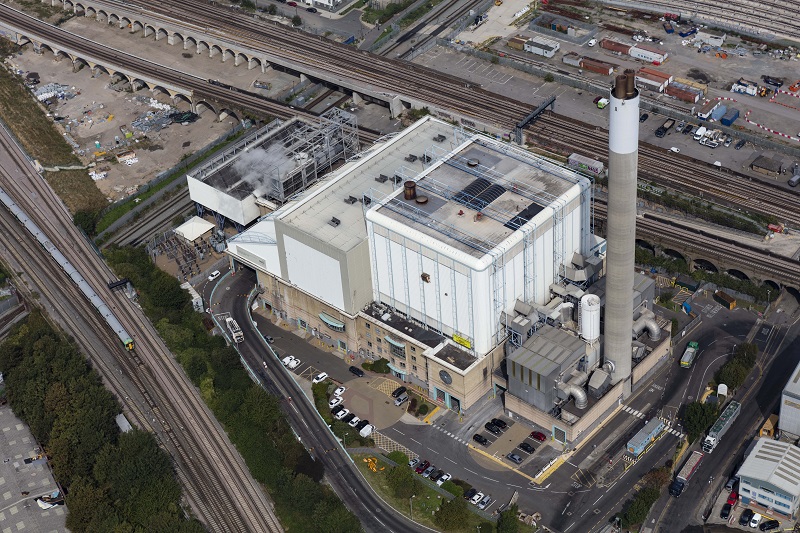
Veolia’s SELCHP plant in London; Gavin Graveson considers more waste should be recovered for energy in the UK rather than being sent overseas as RDF
“We talk about climate change and air quality. Is it the correct thing to be moving waste? – I think there should be a balance. Is it right for us to build all the plants in the north… or should policies be based on the proximity principle?” he adds.
He warns that the easy option to export to the continent is closing, with the proposed Dutch tax coming in: “We’re still exporting 2.5 million tonnes – we should be self-sufficient.”
Certainly, he considers that construction of the plants is more difficult in the south. “But, we’ve seen the Kemsley Wheelabrator site open on a paper mill site in Kent and Veolia is supplying material into it.“
Merchant plants
Does Veolia have any more applications in?
“We are working through them. We are putting applications in and we have one in the South going forward where more recycling and avoidance of landfill are the drivers.”
Mr Graveson reveals that Veolia prefers local decisions. “We will go for local approval rather than direct to the Secretary of State which would be disrespectful of local issues.”
Overall his perspective is that more EfW capacity is definitely needed in the UK and that RDF exports are not as sustainable as they might seem, with the carbon benefits not clear cut. “What about energy security, what about sorting out our own problems, what about being self-sufficient? It’s partly renewable power, plus you have the ability to connect up district heating to it.”
As for whether the UK should be fully self-sufficient in treating waste? “There are certain products that will go out, SRF and certain hazardous materials are exported. We’re not a closed island but I think the balance at the moment is incorrect and it’s showing our vulnerability especially as the Dutch tax could be coming soon.”
Veolia Group
Formerly chief operating officer in the UK & Ireland, Mr Graveson is now fifteen months into his new role. He says that the Group is pretty decentralised with respect to operational matters since customers are local, but provides overall strategy, guidance and importantly, investments.
“We have the ability of pulling on the Group’s expertise from all over the world on technology and systems”
“We are client driven and we can go to Group for worldwide technical support; we have the ability of pulling on the Group’s expertise from all over the world on technology and systems to be the best in class.”
He gives the company’s high temperature incinerator at Ellesmere Plant as a good example of how the Veolia business in France and beyond has helped. “The Group has a number of HTIs throughout the world; we have got our availability higher and our throughput up using the group’s expertise on the different and constantly changing nature of hazardous waste.”
He says this is similar to the plastics market where the Group has a strong relationship in Europe with the plastic manufacturers. “We have plants over there, we use their expertise to make sure our plants are designed correctly and produce a quality product.”
Is there an example of what Veolia UK gives back to the Group?
To answer this, Mr Graveson opts for energy from waste, “we are best in class of EfW availability, you can see that in the Tolvik report on EfW – we were at 94% in the last review. We do our own internal maintenance and we are probably the largest producer of Inconel in the UK. We are a heavily engineering driven company and try to insource as much as we can.”
Personal approach
In terms of what he has personally adopted at Veolia, he puts communication and people at the top of his list.
“To continue our development in our infrastructure and also focus more on what our clients need, we’re a client-driven, customer driven business now.”
For clients, he says this is about communicating with them. “I think independently most of our clients would say they’re glad they chose Veolia because the market is continually evolving and we have the ability to innovate and the capacity to adapt to changing market conditions and deliver ground-breaking projects that are helping ensure the sector is seen in a new light.
He also says that Veolia’s employees are all-important: “People are exceptional in this business, we have graduate and apprenticeship programmes and we have just been honoured at the Princess Royal training awards for our ‘Expect Respect’ programme, protecting operatives on the street.”
Circular economy
As for what’s next for Veolia in the UK, Mr Graveson returns to the circular economy and that he wants the business to continue to offer “a resource economy service to all our clients, public and private sector.”
“We want to continue investing in capital projects including recycling, such as PET, hazardous waste treatment and energy from waste. Ultimately we are committed to the development of the sector in its own right with a potential sector deal in the offing based on a progressive resources and waste strategy.”
The post Policy and recycled content essential, says Graveson appeared first on letsrecycle.com.
Source: letsrecycle.com Waste Managment


